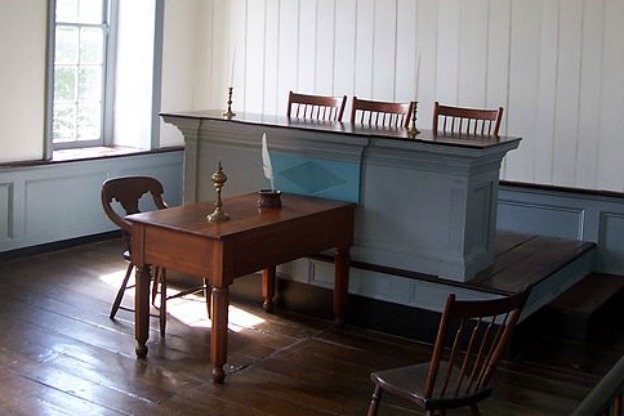Isaac Blackford has a street named after him in Indianapolis—it’s near the Indiana University School of Law in that city, on the IUPUI campus.
But his legacy extends far more than a street name. Blackford was Indiana’s longest-serving Supreme Court justice and the author of the state’s first court reports. In fact, Blackford’s reputation for fastidious attention to detail earned his “Reports” worldwide acclaim in the antebellum years.
Blackford came to Indiana on horseback from his birthplace of New Jersey after graduating from Princeton University, arriving around 1812. His first job was short-lived; he worked as a bank clerk in Vevay, but the bank failed due to fraud and mismanagement, which Blackford is rumored to have uncovered. Blackford then went to Salem, where he worked as Washington County’s first clerk and recorder before being elected Clerk of the Territorial Legislature in Corydon in 1813.
Blackford held that job until 1815, when he was appointed President Judge of the First Judicial Circuit. The life of a circuit judge was lonely, difficult and sometimes dangerous. Circuit judges, often accompanied by the attorneys who also rode the circuit between developing towns and burgs, spent the year crossing the state’s terrain and holding court for a few days, as needed, before moving on to the next town.
After only a year, Blackford quit the circuit bench. He practiced law and politics in Vincennes and was elected Representative from Knox County in 1817. In Corydon, Blackford went on to be elected Speaker of the House at the state’s first House of Representatives.
During this first year of statehood, Indiana’s first supreme court justices entered office and began creating Indiana’s judicial legacy. Justices James Scott, Jesse L. Holman and John Johnson opened the court’s inaugural session on May 5, 1817. The Court issued a total of two opinions before retiring, and Justice Johnson passed away only a few weeks later. Governor Jennings appointed Isaac Blackford, his longtime political ally, to fill the spot. Blackford was initially reluctant to accept—after all, he was only thirty-one years old, and had little legal experience compared to his peers. But once the Senate approved the appointment, Blackford threw himself into his work.
In fact, Blackford was so devoted to his work as a justice of the supreme court that he often labored for days on end, only retiring to his tiny apartment in the governor’s mansion on what is now Monument Circle for minimal amounts of sleep. His work was his life. He presided on the state’s highest court for over thirty-five years and authored over 900 opinions.
Blackford’s real acclaim, and his greatest contribution to the development of this state’s jurisprudence and reputation, came through his work as the first reporter of Indiana decisions. Blackford voluntarily took on the task of accumulating and publishing those opinions of the court which he believed significant. He started the work in 1820. The first of the eight volumes published by Blackford appeared in 1830 and the last in 1850. He selected the decisions that appeared in the reports and then edited them, appended explanatory notes, and even occasionally changed the text of the opinions themselves.
By all accounts, the pains Blackford took to ensure accuracy in his reports were extraordinary. He wrote and edited tirelessly, a drive for perfection bordering on the maniacal. Blackford routinely delayed publication of his volumes to correct minor, even trivial errors. He paid significant sums to his printer to delay printing or to re-run the printing of volumes. Blackford also offered a reward to anyone who looked over his drafts and found errors Blackford’s careful work and exacting reputation for accuracy helped him become famous among lawyers in both in the U.S. and Great Britain.
But when Indiana ratified a new constitution in 1851, justices were no longer chosen by appointment—they were subject to popular election, and Blackford lost his seat. Ironically, even though Blackford would have happily accepted the newly created position of official court reporter, he was denied that as well. Blackford later moved to Washington, D.C. and served on the nation’s first U.S. Court of Claims until his death in 1859.
A Moment of Indiana History is a production of WFIU Public Radio in partnership with the Indiana Public Broadcasting Stations. Research support comes from Indiana Magazine of History published by the Indiana University Department of History.
Source articles:
1. Indiana Supreme Court Legal History Lecture Series, “Accessing Indiana’s Past: Isaac Blackford and 19th Century Slavery Cases,” https://in.gov/judiciary/supreme/lectures/blackford.html
2. Suzanne Weber Lupton, “Isaac Blackford: First Man of the Court,” Indiana Law Review 30 (1997): 319-328.























